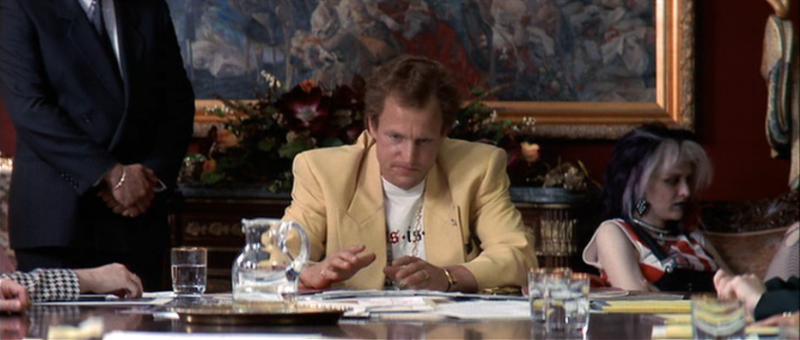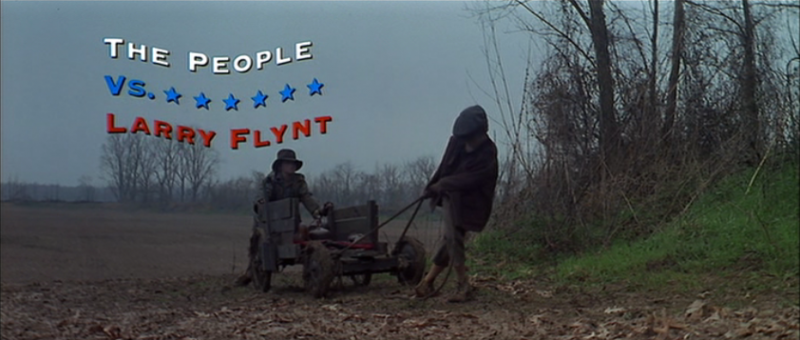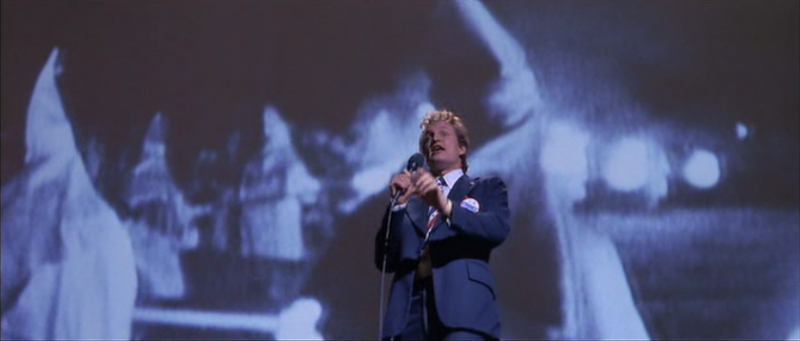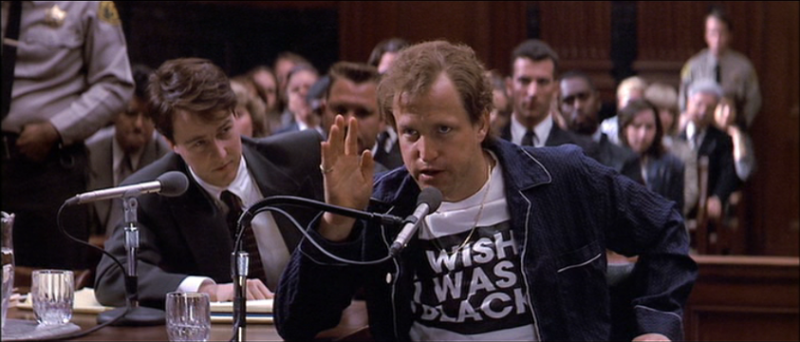It is easy to embrace The People vs. Larry Flynt as a cinematic defense of freedom of speech or deride it as a botched biopic, but I think Milos Forman is smarter than both of those readings. The skeleton key for my understanding of Forman is in the obscure Soviet-era aesthetic stiob, which is a form of absurd humor that requires such an over-identification with the object of its parody that it is difficult to tell whether there is sincere support for the object, subtle ridicule or some strange mix of the two. The clearest practitioner of the form is Paul Verhoeven, though his is lived out in sci-fi movie structure (Total Recall) and genre gaudiness (Starship Troopers) that openly embraces the absurdity of its aesthetic (RoboCop). Forman, on the other hand, is a smuggler, embracing the more conventional structure of Hollywood pictures (Amadeus) and subverting them slyly through his depiction of off-kilter subjects (Man on the Moon). This has led to more universal acclaim for Forman among mainstream critics and an apathetic disinterest in Forman by many serious critics and cinephiles.
I believe The People vs. Larry Flynt presents Forman’s conflicting views of American capitalism and law, through the intelligent script of Scott Alexander and Larry Karaszewski. Forman shows that the logical end of capitalism is exploitation and the national law, regardless of intent, ends up primarily protecting the exploiters rather than the exploited. He also subtly suggests that moral relativism is the philosophical fruit of a consumer society. “I got money, which gives me the power to shake up the system,” Flynt proclaims at one point. But he hardly shakes up the system so much as recodifies it.
Freedom of speech is an
idea often championed by artists, but Larry Flynt is not an artist. Instead, he is depicted as a
businessman who lucks into fame and fortune and then maintains it through his
perpetual disregard of the gentleman’s agreement of public decency. This is not accidental. It is essential to Forman’s purpose
that Flynt be a capitalistic idiot savant, not a scheming, ruthless businessman
or a prophet of immorality as assumed respectively by his two major enemies in
the film, Charles Keating and Jerry Falwell. Larry Flynt is simply an opportunist. And therein lies the absurdity.
From the early scenes as
a ten year-old kid running moonshine, Flynt’s story is given the same aesthetic
approach as a standard Hollywood biopic.
Flynt is American-born and raised, a product of his environment, a
product of capitalism. He has
always been an opportunist and the fact that he names his strip clubs and
eventual magazine Hustler is
an obvious descriptor of his motivations.
But Forman subverts the “work hard and good things will happen” allegory
by showing that Flynt was doing nothing new or original. He wanted to advertise his business and
makes a Hustler newsletter
highlighting the dancers at his club.
The newsletters become popular and he moves into the publishing
business, though the clubs are struggling to pull a profit. He gambles and he gets lucky. He is approached with someone who
has nude photos of Jackie Kennedy.
Flynt prints them and his sales soar.
The cry of the moral
leaders is to beg a smut-peddler like Flynt to keep some things in society
sacred. But there can be nothing
sacred if there is profit to be made.
At one point, Flynt leads a rally and asks the rhetorical question: what
is the greater obscenity: sex or war?
Considering that many wars are fought for the interests of either
economics or national pride, what is the difference?
The film posits a
similar rhetorical question to Flynt’s: what is the greater absurdity: Larry
Flynt or the Supreme Court? Is
Larry Flynt’s grandstanding publicity stunt the absurdity or the fact that the
highest court in the land decided to take a ridiculous personal dispute between
two private citizens seriously enough to give it a hearing? Is it because the two private citizens
are public figures? Is it because
lights and cameras come along with it?
Is it a moment for the judges’ own personal grandstanding? Forman sees the false dichotomy of
Flynt’s original rhetoric and then presents his own. It not as an either/or but a both/and: both Flynt and the
Supreme Court are absurd.
There is a constant
shift in tonality throughout the film because Flynt is constantly
shifting. As new opportunities
arise, as the need for a new way of behaving emerges, Flynt is there to do
whatever is required. He becomes a
showman, changing costumes and personas to entertain his audience and
accomplish his goal of building his brand. He can be well spoken or a babbler, he can be civil or
completely unhinged. He has the
liberty to be unrestrained because fame and fortune have purchased him a
buffer. The law condemns him in
moments to prove he is not above the law but he can be unrestrained in a way
the average citizen cannot. He may
never give a “Greed is Good” speech, but Flynt is a Gordon Gecko who realizes
he cannot be artificially confined by society’s mores. He may lie, exploit women and mock
society’s moral standards, but he never killed anyone. He earned everything he made. As is the case with moral relativism,
there is always the comparison to the illusive greater evil. Sex or war? Only money can answer that question.
Let’s not forget the way
Flynt battled Falwell, the way any all-powerful corporation can fight the
common man: copyright infringement.
Flynt arguing copyright infringement is just as absurd as Falwell
arguing libel and emotional distress over a parody in a magazine Falwell would
never read. It solidifies
Falwell’s brand to fight against Flynt and it solidifies Flynt’s brand to fight
against Falwell. In The People
vs. Larry Flynt, morality and
obscenity just become trademarks of celebrity personalities, slogans of the
corporate self. It is fitting
then, in light of capitalism, that Larry Flynt should win out, since he
symbolizes a capitalistic entity and Falwell symbolizes a non-profit ministry.
What speech is truly
free? Trademarks, copyrights,
public image, branding, advertising: the free speech battles of the future will
be over intellectual property. Set
up a screening of The People vs. Larry Flynt at your local theater to raise awareness and
concern for the first amendment and see if Columbia Pictures supports freedom
of speech or wants free advertising for their movie. The legal structure will always protect those who have the
strength to protect themselves.
That’s Forman’s point. But
Forman also believes that these battles are subjectively fought. Falwell would never have cared had he
never known. Larry Flynt would not
be a free speech advocate had his speech never been hindered.
The screenwriters of
this film, Scott Alexander and Larry Karaszewski (Ed Wood, Problem Child), also collaborated with Forman on a project
that more clearly reveals the key to Forman, Man on the Moon (1999). It takes a similar lens to Andy Kauffman, a less
controversial yet more ambiguous historical figure who’s comedy centered around
the subversion of audience expectation.
Indeed, Man on the Moon
is where I first grasped the potential of Milos Forman’s stiob. These two films really are companion pieces, both dealing with fame and fortune: the American ideals.
The People vs. Larry
Flynt is a distant cousin to
Billy Wilder’s poisonous indictment of print-now-ask-questions-later journalism
in Ace in the Hole (1951) and
Alexander Mackendrick’s desperate, dog-eat-dog tabloids of Sweet Smell of
Success (1957). Does Larry Flynt believe in freedom of
speech? Sure he does, but only
because it sells. Believe it or
not, he has found something more universal than sex. And he will exploit it as long as it returns a profit. He even proudly boasts at one point, “I
have turned the whole world into a tabloid!” Some critics have dismissed the film’s “soft portrait” of
Flynt and the downplaying of the degradation of women by his magazine. But all of these things are present in
subtext. Commercial exploitation
will always involve those perceived as weak and the film, though
over-identifying with Flynt through the first amendment cause, is not reluctant
to paint Flynt as an absurd opportunist, as I have just explained.
The complexity of Forman's portrait is seen most clearly in the ending. The final verdict is
played down. Anti-climactic. The film has lead us to one moment and
then gives us a Flynt who seems to care less, has already moved on and now has
no horn to blow, nothing to exploit.
In a brief moment of introspection, Flynt watches video footage of
Althea from years before her death, before the drugs. We have no clue what he thinks but Forman allows these last
shots to linger. We could assume
he misses her but Forman will give us no tear on Harrelson’s face or bemoaned
sigh. In light of Flynt’s most
definitive triumph and in the face of what seemed to be his one true love, we
only see ambiguity. It is the
ambiguous frustration of having attained something and been left unsatisfied. He will now search restlessly until he
can find the next thing.
While I was in college, I
had the opportunity to hear Milos Forman address a small group of students,
answering questions and giving his stories. Someone asked him what the difference was between making
films in Czechoslovakia and the United States. I was surprised by the conflicted pragmatism of his
response: “In Czechoslovakia, I had artistic freedom but no money. In America, I have money but no
artistic freedom.”
I like to think that if
Forman ever made a sequel to this film, it would be about Larry Flynt appearing
at screenings of The People vs. Larry Flynt to talk about freedom of speech to college
kids. What does the real Larry
Flynt know or care about free speech?
It is an absurdity, the same way it is absurd that an ambiguously common
phrase such as “That was easy” is a registered trademark. Forman doesn’t care if his film will be
co-opted, he doesn’t fight it. He
gives a film that can be used by well-meaning liberals to pat themselves on the
back for their freedom of expression.
He gives a film that Larry Flynt can take and feel good about, a film he
feels presents him as the hero at the forefront of an epic battle. But he’s just a showman and Forman
knows it.




No comments:
Post a Comment